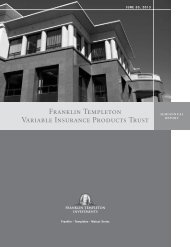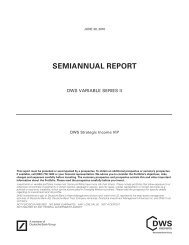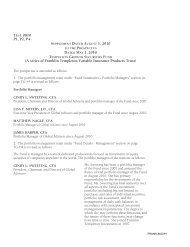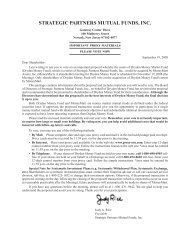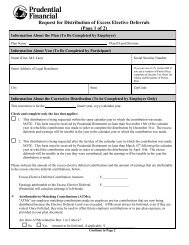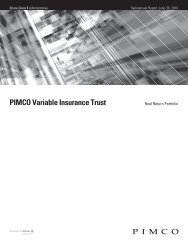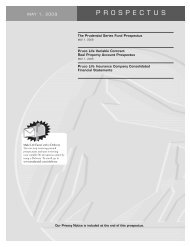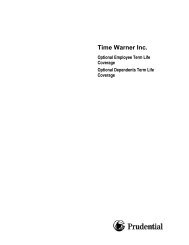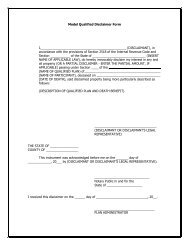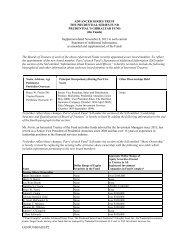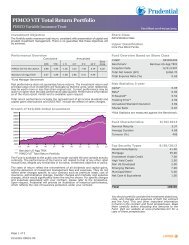The Prudential Series Fund
The Prudential Series Fund
The Prudential Series Fund
Create successful ePaper yourself
Turn your PDF publications into a flip-book with our unique Google optimized e-Paper software.
e subject to liquidity risk.<br />
Foreign Currency Forward Contracts — A foreign currency forward contract is an obligation to buy or sell a given currency on a<br />
future date at a set price. When a Portfolio enters into a contract for the purchase or sale of a security denominated in a foreign<br />
currency, or when a Portfolio anticipates the receipt in a foreign currency of dividends or interest payments on a security which it<br />
holds, the Portfolio may desire to “lock-in” the U.S. dollar price of the security or the U.S. dollar equivalent of such dividend or<br />
interest payment, as the case may be. By entering into a forward contract for a fixed amount of dollars, for the purchase or sale of the<br />
amount of foreign currency involved in the underlying transactions, the Portfolio will be able to protect itself against a possible loss<br />
resulting from an adverse change in the relationship between the U.S. dollar and the foreign currency during the period between the<br />
date on which the security is purchased or sold, or on which the dividend or interest payment is declared, and the date on which<br />
such payments are made or received. At the maturity of a forward contract, a Portfolio may either sell the security and make delivery<br />
of the foreign currency or it may retain the security and terminate its contractual obligation to deliver the foreign currency by<br />
purchasing an “offsetting” contract with the same currency trader obligating it to purchase, on the same maturity date, the same<br />
amount of the foreign currency.<br />
Futures Contracts — A futures contract is an agreement to buy or sell a set quantity of an underlying product at a future date, or to<br />
make or receive a cash payment based on the value of a securities index. When a futures contract is entered into, each party deposits<br />
with a futures commission merchant (or in a segregated account) approximately 5% of the contract amount. This is known as the<br />
“initial margin.” Every day during the futures contract, either the buyer or the futures commission merchant will make payments of<br />
“variation margin.” In other words, if the value of the underlying security, index or interest rate increases, then the buyer will have to<br />
add to the margin account so that the account balance equals approximately 5% of the value of the contract on that day. <strong>The</strong> next<br />
day, the value of the underlying security, index or interest rate may decrease, in which case the borrower would receive money from<br />
the account equal to the amount by which the account balance exceeds 5% of the value of the contract on that day. A stock index<br />
futures contract is an agreement between the buyer and the seller of the contract to transfer an amount of cash equal to the daily<br />
variation margin of the contract. No physical delivery of the underlying stocks in the index is made.<br />
Illiquid Securities — An illiquid security is one that may not be sold or disposed of in the ordinary course of business within seven<br />
days at approximately the price used to determine the Portfolio’s net asset value. Each Portfolio (other than the Money Market<br />
Portfolio) generally may invest up to 15% of its net assets in illiquid securities. <strong>The</strong> Money Market Portfolio may invest up to 10% of<br />
its net assets in illiquid securities. Each Portfolio may purchase certain restricted securities that can be resold to institutional investors<br />
and which may be determined to be liquid pursuant to the procedures of the Portfolios. Those securities are not subject to the 15%<br />
and 10% limits. <strong>The</strong> 15% and 10% limits are applied as of the date the Portfolio purchases an illiquid security. It is possible that a<br />
Portfolio’s holding of illiquid securities could exceed the 15% limit (10% for the Money Market Portfolio), for example as a result of<br />
market developments or redemptions.<br />
Interest Rate Swaps — In an interest rate swap, the Portfolio and another party agree to exchange interest payments. For example, the<br />
Portfolio may wish to exchange a floating rate of interest for a fixed rate. See also “Swaps” defined below.<br />
Joint Repurchase Account — In a joint repurchase transaction, uninvested cash balances of various Portfolios are added together and<br />
invested in one or more repurchase agreements. Each of the participating Portfolios receives a portion of the income earned in the<br />
joint account based on the percentage of its investment.<br />
Loans and Assignments — Loans are privately negotiated between a corporate borrower and one or more financial institutions. <strong>The</strong><br />
Portfolio acquires interests in loans directly (by way of assignment from the selling institution) or indirectly (by way of the purchase of<br />
a participation interest from the selling institution. Purchasers of loans depend primarily upon the creditworthiness of the borrower<br />
for payment of interest and repayment of principal. If scheduled interest or principal payments are not made, the value of the<br />
instrument may be adversely affected. Interests in loans are also subject to additional liquidity risks. Loans are not generally traded in<br />
organized exchange markets but are traded by banks and other institutional investors engaged in loan syndications. Consequently,<br />
the liquidity of a loan will depend on the liquidity of these trading markets at the time that the Portfolio sells the loan.<br />
In assignments, the Portfolio will have no recourse against the selling institution, and the selling institution generally makes no<br />
representations about the underlying loan, the borrowers, the documentation or the collateral. In addition, the rights against the<br />
borrower that are acquired by the Portfolio may be more limited than those held by the assigning lender.<br />
Mortgage-Related Securities — Mortgage-related securities are usually pass-through instruments that pay investors a share of all<br />
interest and principal payments from an underlying pool of fixed or adjustable rate mortgages. <strong>The</strong> Portfolios may invest in mortgagerelated<br />
securities issued and guaranteed by the U.S. Government or its agencies and mortgage-backed securities issued by<br />
government sponsored enterprises such as the Federal National Mortgage Association (Fannie Maes), the Government National<br />
Mortgage Association (Ginnie Maes) and debt securities issued by the Federal Home Loan Mortgage Company (Freddie Macs) that<br />
51



